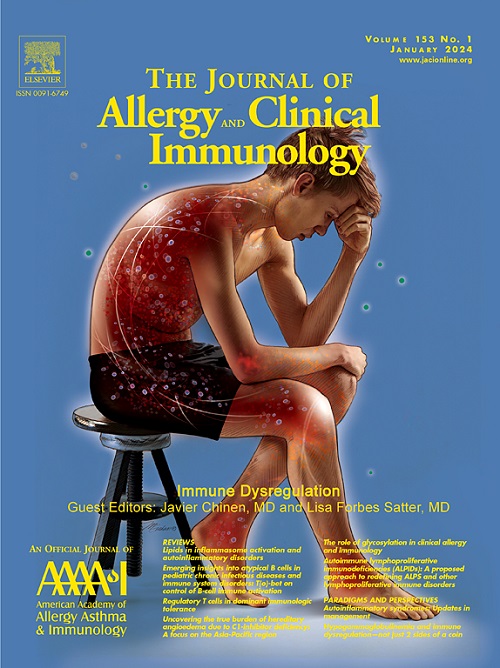Long COVID: Pathophysiology, current concepts, and future directions
IF 11.4
1区 医学
Q1 ALLERGY
引用次数: 0
Abstract
Long COVID, an umbrella term referring to a variety of symptoms and clinical presentations that emerges in a subset of patients after severe acute respiratory syndrome coronavirus 2 (SARS-CoV-2) infection, has a significant effect on quality of life and places a substantial burden on health care systems worldwide, straining financial and human resources. The pathophysiology of long COVID remains incompletely understood, though several hypotheses have been proposed to explain different aspects of this complex condition. SARS-CoV-2 persistence, direct organ damage, innate and adaptive immune system perturbation, autoimmunity, latent virus reactivation, endothelial dysfunction, and microbiome disturbances are among the most relevant avenues for elucidating the evolution, complexity, and mechanisms of long COVID. Active investigation regarding potential biomarkers for long COVID and its associated disease endotypes highlights the role of inflammatory mediators, immunophenotyping, and multiomics approaches. Further advances in understanding long COVID are needed to inform current and future therapeutics.
长冠状病毒-病理生理学,目前的概念和未来的发展方向。
长冠状病毒病是一个总称,指的是SARS-CoV-2感染后一部分患者出现的各种症状和临床表现,它对个人的生活质量产生重大影响,给全球卫生保健系统带来沉重负担,使财政和人力资源紧张。尽管已经提出了几种假设来解释这种复杂情况的不同方面,但长期covid的病理生理学仍然不完全清楚。SARS-CoV-2持续存在、直接器官损伤、先天和适应性免疫系统紊乱、自身免疫、潜伏病毒再激活、内皮功能障碍和微生物组紊乱是阐明长冠状病毒进化、复杂性和机制的最相关途径。对long-COVID及其相关疾病内型的潜在生物标志物的积极研究强调了炎症介质、免疫表型和多组学方法的作用。需要在了解长期covid方面取得进一步进展,以便为当前和未来的治疗提供信息。
本文章由计算机程序翻译,如有差异,请以英文原文为准。
求助全文
约1分钟内获得全文
求助全文
来源期刊
CiteScore
25.90
自引率
7.70%
发文量
1302
审稿时长
38 days
期刊介绍:
The Journal of Allergy and Clinical Immunology is a prestigious publication that features groundbreaking research in the fields of Allergy, Asthma, and Immunology. This influential journal publishes high-impact research papers that explore various topics, including asthma, food allergy, allergic rhinitis, atopic dermatitis, primary immune deficiencies, occupational and environmental allergy, and other allergic and immunologic diseases. The articles not only report on clinical trials and mechanistic studies but also provide insights into novel therapies, underlying mechanisms, and important discoveries that contribute to our understanding of these diseases. By sharing this valuable information, the journal aims to enhance the diagnosis and management of patients in the future.

 求助内容:
求助内容: 应助结果提醒方式:
应助结果提醒方式:


